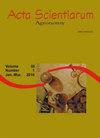Adaptation and indication of forage crops for agricultural production in sandy soils in western Bahia State, Brazil
IF 1.2
4区 农林科学
Q3 AGRONOMY
引用次数: 1
Abstract
The diversity of soils and climate in Brazil imposes the need to evaluate the adaptation of fodder species to soil and climate conditions to guide producers and technicians in choosing the best alternatives for their region. The objective of this study was to evaluate and identify fodder cultivars for pasture and soil cover with tolerance to drought and high production in the sandy soils of southern Bahia, Brazil. The performance of 29 commercial cultivars of perennial and annual tropical forage species was evaluated in six cuts in 2019 and 2020. The green and dry mass yield per cut and the daily dry matter accumulation rate were evaluated considering the periods of water surplus and deficit and the drought tolerance index for each cultivar was estimated. Grass and legume cultivars showed differences in establishment, yield in the water surplus, and in the re-establishment after the water deficit. Based on the values of the drought tolerance index and in the dry mass daily yields before and after the water deficit, the cultivars adapted and indicated for regional continuous grazing were Xaraés, Marandu, Massai, Tanzânia, Paiaguás, and Zuri, in that order. The grasses B. ruziziensis and B. decumbens were indicated for use as cover plants after the harvest due to their high capacity of establishment and short-term production. The annual and perennial legume plants were also indicated for cover, and the combination of cultivars and their potential for straw in direct planting or use in integrated systems still need to be validated.巴西巴伊亚州西部沙质土壤中饲料作物对农业生产的适应和指示
巴西土壤和气候的多样性要求有必要评估饲料品种对土壤和气候条件的适应性,以指导生产者和技术人员为本地区选择最佳替代品。本研究的目的是在巴西巴伊亚州南部的沙质土壤中评价和鉴定具有耐旱和高产的牧草和土壤覆盖的饲料品种。对29个多年生和一年生热带牧草商业品种在2019年和2020年分6个季节进行了性能评价。考虑水分亏盈期,评价了各品种的单株干、绿质量产量和日干物质积累速率,并估算了各品种的耐旱性指数。禾本科和豆科品种在水分过剩时的恢复、产量和水分亏缺后的恢复方面存在差异。从耐旱性指数和水分亏缺前后的干质量日产量看,适合和适合区域连续放牧的品种依次为xarasamis、Marandu、Massai、tanz、Paiaguás和Zuri。因其成活率高,短期生产能力强,可作为采收后的覆盖植物。一年生和多年生豆科植物也可作为覆盖植物,品种组合及其在直接种植或综合系统中用作秸秆的潜力仍有待验证。
本文章由计算机程序翻译,如有差异,请以英文原文为准。
求助全文
约1分钟内获得全文
求助全文
来源期刊

Acta Scientiarum. Agronomy.
Agricultural and Biological Sciences-Agronomy and Crop Science
CiteScore
2.40
自引率
0.00%
发文量
45
审稿时长
>12 weeks
期刊介绍:
The journal publishes original articles in all areas of Agronomy, including soil sciences, agricultural entomology, soil fertility and manuring, soil physics, physiology of cultivated plants, phytopathology, phyto-health, phytotechny, genesis, morphology and soil classification, management and conservation of soil, integrated management of plant pests, vegetal improvement, agricultural microbiology, agricultural parasitology, production and processing of seeds.
 求助内容:
求助内容: 应助结果提醒方式:
应助结果提醒方式:


